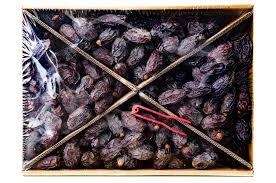Medjoul Dates: Nature's Sweet Superfruit

Medjoul dates, often referred to as the "king of dates," are among the most popular and luxurious varieties of dates available today. Known for their large size, rich caramel-like flavor, and soft, chewy texture, Medjoul dates have gained popularity around the world not only for their taste but also for their impressive nutritional benefits.
Origin and Cultivation
Medjoul dates originate from the Middle East and North Africa, particularly countries such as Morocco, Israel, Saudi Arabia, and Jordan. They are grown on date palm trees in hot, arid climates where the soil is sandy and well-drained. The dates require a lot of sunlight and minimal rainfall, making desert regions ideal for their cultivation. Harvesting Medjoul dates is a labor-intensive process, as they are picked by hand to ensure their delicate skin is not damaged.
Nutritional Value
Medjoul dates are considered a nutrient-dense food. They are naturally high in sugars, primarily glucose and fructose, which makes them an excellent source of quick energy. They also contain essential vitamins and minerals such as potassium, magnesium, copper, and vitamin B6. Furthermore, Medjoul dates are rich in dietary fiber, which supports digestive health and helps regulate blood sugar levels when consumed in moderation.
Another key benefit is their antioxidant content. Medjoul dates contain various antioxidants, including flavonoids, carotenoids, and phenolic acid, which help protect the body from inflammation and oxidative stress. These properties make them a valuable addition to a healthy diet.
Culinary Uses
Medjoul dates are extremely versatile in the kitchen. They can be eaten on their own as a snack or used in a variety of recipes. Their natural sweetness makes them a great alternative to refined sugar in desserts and smoothies. They can also be stuffed with nuts or cheese, wrapped in bacon for appetizers, or chopped and added to salads, cereals, and baked goods.
In Middle Eastern and Mediterranean cuisines, Medjoul dates are often used in traditional dishes during religious festivals and family gatherings. They are a staple during Ramadan, where they are commonly eaten to break the fast.
Storage and Shelf Life
To preserve their freshness and texture, Medjoul dates should be stored in an airtight container. They can be kept at room temperature for a few weeks, but for longer shelf life, refrigeration is recommended. In the fridge, they can last for several months without losing their quality. Freezing is also an option, particularly for bulk storage.
Conclusion
Medjoul dates are more than just a sweet treat. They are a natural source of energy, packed with nutrients, and have a wide range of culinary applications. Whether you are looking for a healthy snack, a sugar substitute, or an ingredient to enhance your cooking, Medjoul dates offer a delicious and wholesome solution. Their rising popularity in global markets reflects their unmatched taste and health benefits, making them a true superfruit worth including in your diet.
- Art
- Causes
- Crafts
- Dance
- Drinks
- Film
- Fitness
- Food
- Games
- Gardening
- Health
- Home
- Literature
- Music
- Networking
- Other
- Party
- Religion
- Shopping
- Sports
- Theater
- Wellness
